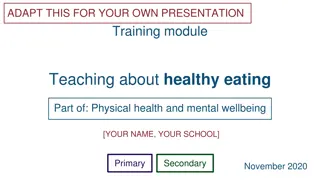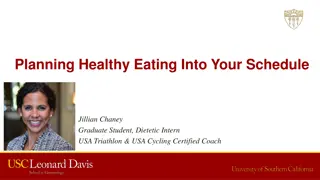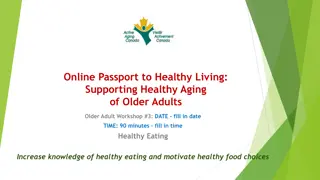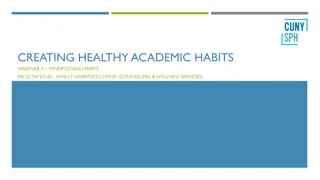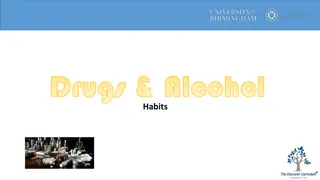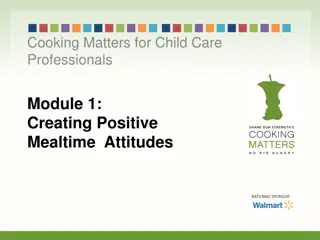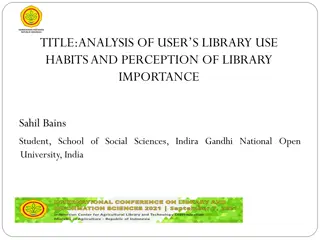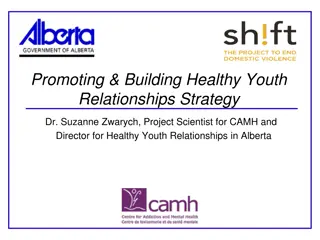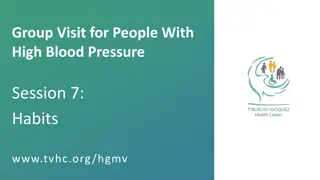CREATING HEALTHY ACADEMIC HABITS
This webinar series delves into essential habits for academic success, with a focus on self-care facilitated by Ashley Harwood. Explore the concept of self-care, barriers to it, myths surrounding it, and the benefits it offers, especially during grad school. Learn practical tips to prioritize your well-being and improve overall quality of life. Join us to enhance your time management, goal setting, stress reduction, and more.
Download Presentation

Please find below an Image/Link to download the presentation.
The content on the website is provided AS IS for your information and personal use only. It may not be sold, licensed, or shared on other websites without obtaining consent from the author.If you encounter any issues during the download, it is possible that the publisher has removed the file from their server.
You are allowed to download the files provided on this website for personal or commercial use, subject to the condition that they are used lawfully. All files are the property of their respective owners.
The content on the website is provided AS IS for your information and personal use only. It may not be sold, licensed, or shared on other websites without obtaining consent from the author.
E N D
Presentation Transcript
CREATING HEALTHY ACADEMIC HABITS WEBINAR 3 IMPLEMENTING SELF-CARE FACILITATED BY: ASHLEY HARWOOD, LMSW (COUNSELING & WELLNESS SERVICES)
HABITS THAT WELL COVER IN THIS WEBINAR SERIES: Time Management Goal Setting Self Care (This week!) Mindfulness Stress Reduction Combating Perfectionism Building Positive Self Talk
WHAT IS SELF-CARE? Self-care is typically viewed as a simple break from the every day; a moment where a person can focus on something they enjoy. However, it is actually a bit more involved. A better way to view self-care would be as a continuous process. It is a set of activities that maintain physical, mental, and emotional well-being. Typically, self-care needs to be ongoing to be effective. When viewed holistically, self-care includes all of the tasks associated with health and well-being. On the simplest end, this could consist of nutrition, basic personal hygiene, exercise, and getting enough sleep. However, it should also include activities that reduce stress, regardless of whether those activities fall in any of these categories. *Adapted from https://thescholarshipsystem.com/blog-for-students-families/self-care-tips-for-college-students/
BARRIERS TO SELF-CARE Lack of time Feeling guilty and selfish Not understanding how to practice self care Wanting to be perfect Believing self care is expensive Not setting boundaries Placing the needs of others before your own Believing that you don t need or deserve it Mental health conditions
MYTHS ABOUT SELF-CARE Self-care is selfish. By taking care of yourself first, it will allow you to be more present for others. Self-care is a luxury. You do not need to spend any money to engage in self-care. Self-care is earned. You are inherently deserving of self-care. Self-care is optional. Self-care is essential to physical and emotional health. Self-care is time-consuming. You only need to spend a few minutes. Self-care is just anything that feels good. Some pleasurable activities can be damaging, especially in excess or over time. Self-care is always exciting. Self care takes discipline and consistency and is not always exciting. *Adapted from https://www.mcateepsychology.com/post/seven-myths-about-self-care
BENEFITS OF SELF-CARE (ESPECIALLY DURING GRAD SCHOOL!) Self-care can provide a wide range of benefits. By managing your well-being and overall health, you can better manage stress and the host of obligations you have to juggle. As stress diminishes, you may notice you re more productive and have an easier time concentrating. Your self-esteem may improve, resulting in more outward confidence. Essentially, self-care allows you to be at your best, maximize your potential, increase your ability to deal with stressors, and improve the overall quality of your life. *Adapted from https://thescholarshipsystem.com/blog-for-students-families/self-care-tips-for-college-students/
HABIT 1: PHYSICAL SELF-CARE (EXAMPLES) Get 7 to 8 hours of sleep each night Wake up and go to bed at the same time every day Exercise for 20 to 30 minutes at least three to five days a week Focus on proper nutrition and limit sugar and caffeine intake Drink enough water Engage in relaxing activities, like taking a walk, meditating, gentle stretching, and deep breathing exercises Take a nap Walk or bike to class instead of driving or taking the bus Take the stairs instead of the elevator Practice good hygiene *Adapted from https://thescholarshipsystem.com/blog-for-students-families/self-care-tips-for-college-students/
HABIT 2: PROFESSIONAL SELF-CARE (EXAMPLES) Set boundaries with colleagues and supervisors Utilize lunch and break times Get support with challenging tasks Use sick time as needed and vacation time routinely If working from home, try to create a work station where your work is separate from you personal activities Remember that self care is an ethical responsibility to most professions
HABIT 3: SOCIAL SELF-CARE (EXAMPLES) Call or visit a family member or friend Join fun student organizations to make friends Sign up for a study group to make learning social Grab a meal with a fellow student Catch up with your roommates Make shopping a group activity *Adapted from https://thescholarshipsystem.com/blog-for-students-families/self-care-tips-for-college-students/
HABIT 4: MENTAL & EMOTIONAL SELF-CARE (EXAMPLES) Make time for activities that engage you in a fun way (puzzles, reading, art, etc.) Reflect on past achievements or successes (journal this out!) Take breaks when studying Study slowly over a period of time instead of cramming Clean up your room (clutter can increase feelings of anxiety or be distracting when you need to focus) Say no if committing to a request is genuinely too taxing or your calendar is full Smile (this can help boost positive feelings) Keep a journal so you have a place to be honest about your feelings Counter negative thoughts with optimistic ones (view a challenge as an opportunity for growth) Help someone (being helpful can be gratifying) Watch funny movies, television shows, or video clips for a quick laugh Ask for help if you need it *Adapted from https://thescholarshipsystem.com/blog-for-students-families/self-care-tips-for-college-students/
SELF-CARE & MENTAL HEALTH It is important to note that self-care is designed to help with well-being. However, even if it can typically make a difference, it isn t a solution in all cases. At times, getting help from a medical professional is a necessity. Self-care should not be viewed as a substitute for formal mental health care. Instead, it may be better classified as supplemental to a treatment plan in those scenarios. If you have a mental health concern, seek support from a professional such as SPH Counseling & Wellness Services or an outside provider. A professional can help you determine the potential cause of your concerns/stressors and create a suitable treatment plan based on your unique needs. *Adapted from https://thescholarshipsystem.com/blog-for-students-families/self-care-tips-for-college-students/
REMINDER TO: UTILIZE CUNY SPH COUNSELING & WELLNESS SERVICES OR MENTAL HEALTH RESOURCES IN YOUR COMMUNITY SPH Counseling & Wellness: Free counseling support for students living in NY state. We can offer referrals for students out of state. https://sph.cuny.edu/students/student-services/student-wellness/counseling-and-wellness-services/ Mental Health Resources: For free 24/7 support or referrals there is CUNY Crisis, NYC WELL or the national 988 mental health hotline (info below) Crisis Text Line: Text CUNY to 741741 for crisis counseling NYC WELL: Text WELL to 65173; Chat:https://nycwell.cityofnewyork.us/en/; Call 1-888-NYC-WELL (1-888-692-9355) 988: Text to 988; Chat:https://988lifeline.org/chat/; Call 988 For outside providers: Search providers through your health insurance website Psychology Today: https://www.psychologytoday.com/ Open Path Collective: https://openpathcollective.org/ Telehealth clinics: Mindful Care https://www.mindful.care and Lifestance Health https://lifestance.com/
REMINDER TO: PRACTICE POSITIVE AFFIRMATIONS Today I will share my positive attitude I trust myself I listen to advice from others I am capable of success My hard work will lead me to my goals I am stronger than any challenge I face I spread positivity and kindness
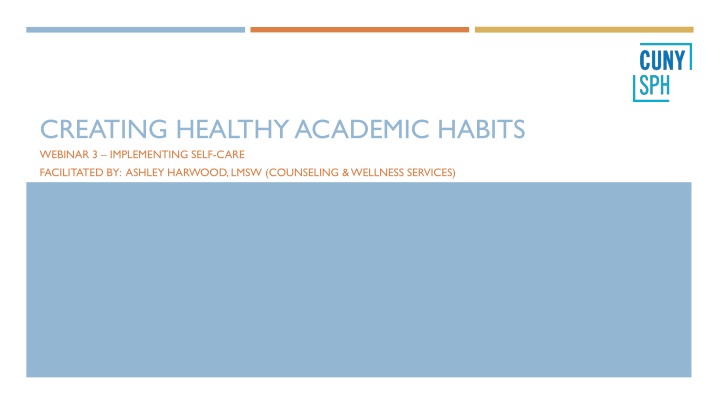

![READ [PDF] Dash diet Cookbook for beginners: 365 days of simple, healthy, low-s](/thumb/2057/read-pdf-dash-diet-cookbook-for-beginners-365-days-of-simple-healthy-low-s.jpg)

